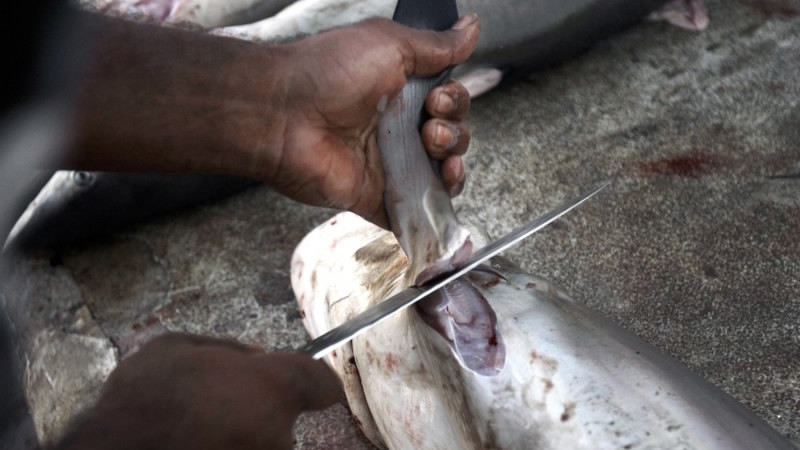
Animal
21:18, 24-Sep-2017
Shark fin bans might not help sharks, scientists say

Democratic Senator Cory Booker's proposed a ban on the sale of shark fins in the US has been warmly received by conservation groups. However, marine scientists David Shiffman and Robert Hueter believe otherwise, saying the effort could actually harm attempts to conserve the marine predators.
Shiffman and Hueter authored a study that appears in the November issue of the journal Marine Policy, saying that the US has long been a leader in shark fisheries management and that shutting down the US fin trade entirely would remove a model for sustainability for the rest of the world.
The US also is a minor contributor to the worldwide shark fin trade, and countries with less regulated fisheries would likely step in to fill the void if the US left the business altogether, Shiffman said.
“Removing that from the marketplace removes a template of a well-managed fishery,” said Shiffman, a shark researcher with Simon Fraser University in British Columbia. “It’s much easier for us to say, here’s a way you can do this.”
Shark fins are most often used in a soup considered a delicacy in Asia. Shark fins that American fishermen harvest are often shipped to Asia for processing.
Environmentalists and animal advocates have long blamed shark fin soup for the decline of certain shark species. Their criticism often includes arguments against “finning,” which is a practice that’s illegal in the United States and involves removing the fins from recently caught, often live sharks and discarding the animals.

A worker collects pieces of shark fins dried on the rooftop of a factory building in Hong Kong, 2013. Shark fins are most often used in a soup considered a delicacy in Asia. /AP Photo
A worker collects pieces of shark fins dried on the rooftop of a factory building in Hong Kong, 2013. Shark fins are most often used in a soup considered a delicacy in Asia. /AP Photo
Nearly a quarter of US states have bans in place on the sale of fins, and sharks were afforded new protections with the Shark Conservation Act of 2010. But the country still has hundreds of shark fishermen, and they are allowed to have the shark’s fins removed for sale during processing on land.
Booker’s proposal would change that, making it illegal for any person to “possess, transport, offer for sale, sell, or purchase shark fins or products containing shark fins.” The bill was approved by a commerce and science committee in May, and a similar bill has been proposed in the House of Representatives.
More than 100 scientists have endorsed the bill, said Kristin Lynch, a spokeswoman for Booker.
“Unfortunately, current laws have proven inadequate at stopping the trade of fins from threatened and endangered sharks,” she said.
Marine conservation group Oceana is standing by Booker’s proposal, said Lora Snyder, a campaign director for the group. Shutting down the fin trade is akin to getting the US out of the ivory business, she said.
A “near total” ban on commercial elephant ivory took hold in the US last year, according to the US Fish & Wildlife Service.
The US fin trade needs to be shut down in part because violations of the “finning” ban have continued to take place, Snyder said. An investigation by Booker’s office earlier this year showed that the National Oceanic and Atmospheric Administration has investigated more than 500 incidents of alleged shark finning since 2010.
“Yes, we are better, but just because we are better doesn’t mean we are good,” Snyder said. “There are other threats facing sharks, but this is a very important step in the right direction.”
Some commercial fishing groups have vowed to fight efforts to shut down the fin trade. About a quarter of the value of a shark is in its fins, and the rest is in its meat, Shiffman and Hueter’s study said.
That means the fin ban is essentially an effort to shut down shark fishing altogether, said Jeff Oden, a Hatteras, North Carolina, fisherman who started fishing for sharks about 30 years ago.
“They want to stop it, just period,” he said. “Forget the fact that we fish sustainably in this country.”
(Top photo: A worker cuts a shark fin at a fish market in Dubai, United Arab Emirates, June 12, 2012. /AP Photo)
Source(s): AP

SITEMAP
Copyright © 2018 CGTN. Beijing ICP prepared NO.16065310-3
Copyright © 2018 CGTN. Beijing ICP prepared NO.16065310-3